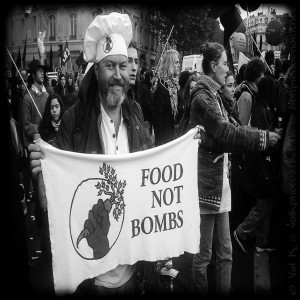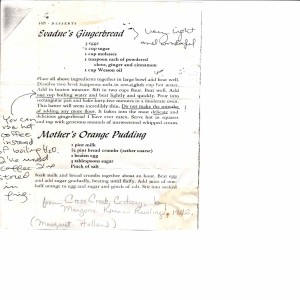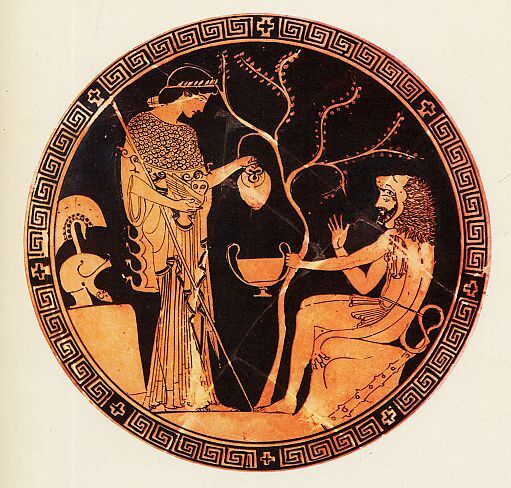
Thought About Food is a podcast on food and food studies. Each episode, we look at important issues around food, and we talk to academics, activists, or policymakers who work on these issues.
Thought About Food is a podcast on food and food studies. Each episode, we look at important issues around food, and we talk to academics, activists, or policymakers who work on these issues.
Episodes

Wednesday Sep 29, 2021
Jennifer Molidor on Just Food Systems and Sustainable Agriculture
Wednesday Sep 29, 2021
Wednesday Sep 29, 2021
This episode we spoke with Jennifer Molidor about food justice and sustainable agriculture, and how that can be pursued in public policy, activism, and changing individual diets. We also talk about pursuing alternatives to academic careers. It's a lot of fun, and really interesting.
Show Notes:
- Follow us on Twitter at @FoodThoughtPod, and you can drop us a line at ThoughtAboutFood on Gmail. Rate our podcast and leave us a review wherever you get your podcasts! It helps people find the show.
- Jennifer Molidor is a senior food campaigner at the Center for Biological Diversity. That organization also has a website devoted to food issues called Take Extinction Off Your Plate, and you can follow her on Twitter @JenniferMolidor
- Jennifer was kind enough to share a recipe with us. It's a family-favorite vegan sandwich, and I can report it's great! Here's what she had to say:
"I had a hard time choosing something, from power bowls to smoothies to my renowned guacamole, but I’ll go with a simple sammich because mom-life means a lot of sandwiches that are packed with protein and deliciousness. It’s a smushed chickpea sandwich and measurements are all to taste:
- Toasted bread
- Plant-based mayo
- Lightly toasted mustard seeds
- Dijon mustard
- Small chopped red onion
- Small chopped leek
- 1 tsp Himalayan salt
- 1 pinch black pepper
- 1-2 cans of chickpeas, drained
- 1 cup chopped celery
- 1 cup chopped pickles
- 4 cloves minced fresh garlic
- 2 tsp apple cider vinegar
- 2 tsp lemon juice
- Pinch of cayenne
Use flavors to taste, but be generous with salt and mayo. Mash chickpeas, mustard and mustard seeds, add in onions, garlic, leek, pickles, celery, and other spices (mash with fork or masher). Add in mayo, lemon juice, vinegar. Taste, adjust as necessary. If you want, you can add nori sheets or yeast to make it more savory/tuna-like. Add parsley or cilantro if you’re into that kind-a thing. This is great alone or in sandwiches and lasts a few days refrigerated. I add avocado slices and tomatoes on my sandwiches with this to keep it juicy."
- The intro and outro music is "Whiskey Before Breakfast" which is both a great traditional song and a great starter before a chickpea sandwich in the morning. It was performed and shared by The Dan River Ramblers under a Creative Commons license.

Sunday Sep 19, 2021
Shanti Chu on Identity and Food
Sunday Sep 19, 2021
Sunday Sep 19, 2021
This episode we spoke with Shanti Chu about the ways our identity and what we eat interact. We also talk about the different ways philosophers can talk about philosophical issues inside and outside academia.
Show Notes:
- Follow us on Twitter at @FoodThoughtPod, and you can drop us a line at ThoughtAboutFood on Gmail. Leave us a review wherever you get your podcasts! It helps people find the show.
- Shanti Chu is a philosopher living and working in Chicago. To see some of the cool things she's working on, you can visit her personal page, her vegetarian/vegan blog ChiVeg, her YouTube page, and her Instagram.
- Shanti was kind enough to share a recipe with us that's meaningful to her -- Hearty Tofu Paprikash. As she says,
"Being half Hungarian, I grew up eating delicious and flavorful Hungarian food. My Hungarian upbringing has influenced me to the extent of using Paprika in most of my dishes because I can’t live without the flavor.
While some Hungarian classics are meat-heavy, they can easily be veganized. For example, chicken paprikash is a staple of the Hungarian diet and it is a very remarkable, comforting dish but it has a lot of meat and dairy in it. Just because you are vegetarian or vegan doesn’t mean you have to stop eating your Hungarian favorites. Why not make this Hungarian staple vegetarian friendly with all the scrumptious tomato/paprika flavor?"
- The intro and outro music is "Whiskey Before Breakfast" which is both a great traditional song and a great way for me to express my identity. It was performed and shared by The Dan River Ramblers under a Creative Commons license.

Sunday Sep 12, 2021
Tony Chackal on Supper Clubs
Sunday Sep 12, 2021
Sunday Sep 12, 2021
This episode we spoke with Tony Chackal about "supper clubs" -- how you can start one, and the political, social, and cultural implications of the practice of providing food as a host or receiving food as a guest.
Show Notes:
- Follow us on Twitter at @FoodThoughtPod, and you can drop us a line at ThoughtAboutFood on Gmail. Leave us a review wherever you get your podcasts! It helps people find the show.
- Tony Chackal is a philosopher and Visiting Assistant Professor in the Philosophy Department at Miami University.
- Tony kindly agreed to create a playlist to listen to with your supper club. Take a listen, and if you start a supper club, let us know!
- The book I couldn't come up with the name of was obviously Bowling Alone
- The intro and outro music is "Whiskey Before Breakfast" which is both a great traditional song and a possible inspiration for a "pre-breakfast club" that you could also consider starting. It was performed and shared by The Dan River Ramblers under a Creative Commons license.

Sunday Sep 05, 2021
Ilana Braverman on the Better Food Foundation
Sunday Sep 05, 2021
Sunday Sep 05, 2021
This episode we spoke with Ilana Braverman about the Better Food Foundation and how to affect people's choices around food.
Show Notes:
- Follow us on Twitter at @FoodThoughtPod, and you can drop us a line at ThoughtAboutFood on Gmail. Leave us a review! It helps people find the show.
- Ilana Braverman is Director of Outreach for the Better Food Foundation, and leads the DefaultVeg campaign. You can listen to Ilana's Tedx talk here, Moving Beyond a Hamburger Default World.
- You can visit the Better Food Foundation's website to get involved, or the direct site for their project DefaultVeg.
- The intro and outro music is "Whiskey Before Breakfast" which is both a great traditional song and an interesting morning default. It was performed and shared by The Dan River Ramblers under a Creative Commons license.

Sunday Aug 29, 2021
Keith McHenry on Food Not Bombs
Sunday Aug 29, 2021
Sunday Aug 29, 2021
This episode we spoke with Keith McHenry about Food Not Bombs, Anarchism, and the radical potential of feeding people as a political act.
Show Notes:
- Follow us on Twitter at @FoodThoughtPod, and you can drop us a line at ThoughtAboutFood on Gmail. Leave us a review! It helps people find the show.
- Keith McHenry is one of the founders of Food Not Bombs
- Keith has written a number of books, including Hungry For Peace: How you can help end poverty and war with Food Not Bombs and The Anarchist Cookbook (not the one you're thinking of, but a "real anarchist cookbook" as Keith says).
- To find a local Food Not Bombs near you, or for resources on starting one, check out the Food Not Bombs website. The one nearest to me is the Food Not Bombs RGV branch.
- The intro and outro music is "Whiskey Before Breakfast" which is both a great traditional song and not an impediment to getting served by Food Not Bombs if you're hungry, because they serve anyone, sober or not. It was performed and shared by The Dan River Ramblers under a Creative Commons license.

Monday Apr 26, 2021
Christopher Carter on The Spirit of Soul Food
Monday Apr 26, 2021
Monday Apr 26, 2021
This episode we spoke with Christopher Carter about faith, black veganism, and soul food.
Show Notes:
- Follow us on Twitter at @FoodThoughtPod, and you can drop us a line at ThoughtAboutFood on Gmail. Leave us a review! It helps people find the show.
- Christopher Carter is an Assistant Professor and Assistant Chair of the Theology and Religious Studies department at the University of San Diego and a Faith in Food Fellow at Farm Forward.
- Christopher's forthcoming book is The Spirit of Soul Food: Race, Faith, and Food Justice from the University of Illinois Press.
- Christopher mentions that his use of Black Veganism is directly inspired by Aph Ko and Syl Ko's book Aphro-ism: Essays on Pop Culture, Feminism, and Black Veganism from Two Sisters
- Christopher shared a recipe for red beans and rice, one of the first that he successfully "veganized." This also counts as a teaser for his book, since this recipe and others are included throughout the text (something I wish more academic books on food would do!):
Red Beans & Rice
For me, a Black man whose American ancestry begins in Mississippi and Louisiana, the foundational soul food dish will always be red beans and rice. This recipe was a staple in my childhood, something we could eat on special occasions and when our budget for food was slim. For me, red beans and rice feels like home. When the pervasive reality of racism knocks me offcenter, red beans and rice can be the ground from which I can regain my sense of self and remember myself as beloved by my community and beloved by the Ultimate source of compassion. Despite all the stress, micro, and macro aggressions I may face, sitting down at the dinner table and eating red beans gives me a little something to help me keep-on-keeping-on, as the elders would say.
If we think about the history of Black foodways as a window into the racism that was and continues to be foundational to our domestic food system, we realize that Black foodways have a deeper meaning that can easily be overlooked. Knowing this history and finding ourselves within this story prompts theological reflection and response. Decolonial analysis seeks to unsettle the notion that theory and praxis are necessarily separate from each other—theory is thinking, and thinking is doing, and praxis necessarily requires thought-reflection on actions. Both my Christian faith and my identity as Black man influence the analysis, arguments, and constructive proposals that I put forth in this book. What some might see as a provocative suggestion, black veganism, is rooted in these two identities. However, what follows in this book is not a straightforward argument for veganism. My own path to veganism was not straightforward, it was a complicated and challenging transition and it would be foolish to expect otherwise from anyone else but especially Black people given the ways that our foodway is racialized. Black veganism is a process of being and becoming, knowing who we are and what tools we need to use so that Black foodways can be a source of abundant life for Black communities.
When I became vegetarian and subsequently transitioned to veganism, I feared that my evolving diet compromised my ability to feel like I was a part of my community when we sat down for meals. Moreover, if I could not eat red beans and rice, I wondered, “what kind of Black person would I be,” could I still claim to be standing on the culinary shoulders of my ancestors? Finding a vegan version of this dietary staple opened my eyes to the creativity one can have cooking soul food. Preparing it and serving it to my family revealed that this delicious version conjures the same familial memories as its nonhuman animal meat-based alternative, and thus possesses the strength to become a foundational family dish too. Because of this, red beans and rice is the first dish we set out upon our vegan soul food table.
Ingredients:
Two 15oz. cans of Kidney beans, rinsed and drained
4 cups of broth made from Better than Bouillon Vegetable base
4 vegan sausages (I highly recommend Field Roast Apple Sage, Italian, or Mexican Chipotle)
1 tablespoon of grapeseed oil (or any high heat oil)
1 large white onion, diced medium
6 six-inch celery stalks, diced small
6 garlic cloves, minced
1 teaspoon chili powder
1 teaspoon Cajun seasoning
1 teaspoon dried thyme
1 red bell pepper, cored, seeded, and chopped
½ cup of green onions
Directions
Heat a 4-5 quart stew pot over high heat, add the oil and wait until it shimmers. Add the onion
and celery and cook, stirring with a wooden spoon, until translucent, about 10 minutes. Add the
garlic and cook about 2 minutes more. Add the sausage, chili powder, thyme, broth, beans, and
bell pepper. Bring to a simmer and cook for 10-15 minutes, stirring frequently. Season with salt,
pepper, and your favorite hot sauce. Serve over a bed of rice, garnish with the green onions. - The intro and outro music is "Whiskey Before Breakfast" which is both a great traditional song and an interesting interpretation of "praxis." It was performed and shared by The Dan River Ramblers under a Creative Commons license.

Monday Apr 12, 2021
Megan Birk on the History of Farms for the Poor
Monday Apr 12, 2021
Monday Apr 12, 2021
This episode we spoke with Megan Birk about the history of "Poor Farms" in the US.
Show Notes:
- Follow us on Twitter at @FoodThoughtPod, and you can drop us a line at ThoughtAboutFood on Gmail. Leave us a review! It helps people find the show.
- Megan Birk is an Associate Professor of History at UTRGV.
- Megan has written the book Fostering on the Farm: Child Placement in the Rural Midwest, and her new book is The Fundamental Institution: Poverty, Social Welfare, and Agriculture in Poor Farms which is under contract at University of Illinois Press.
- The main article about Poor Farms which we discussed in the interview was The better the farm, the better the food: institutional diet, agricultural practices, and nutrition in U.S. almshouses
- Megan shared a recipe for Chocolate Mayonnaise Cake (!) Here's what she has to say about it:
"This is a cake that my mom used to make regularly when I was a kid, and I make it for friends, family, and holidays because it's delicious and people love it. It's also very Midwestern to use mayonnaise as a shortcut in baking
Chocolate Mayonnaise Cake
1 and a half cups white sugar
1 and a half cups mayo (do not use miracle whip)
4 TBS baking coco
---- mix together
3 cups cake flour
3 tsp baking soda
1/4 tsp salt
----- add these to mix above
1 and a half cups warm water
2 tsp vanilla
----- add to above and mix ---- the mixture will be pretty loose (or runny) that's ok
I grease and flour a cake pan before pouring in the mix and baking at 350 degrees for 25-30 on the top rack
Frost with whatever you're into, I don't make my own frosting because I hate the texture of powdered sugar on my hands (I know I'm a weirdo) "
- The intro and outro music is "Whiskey Before Breakfast" which is both a great traditional song and a good thing to try before baking Chocolate Mayonnaise Cake. It was performed and shared by The Dan River Ramblers under a Creative Commons license.

Sunday Mar 28, 2021
Paul Thompson on The Future of Farming
Sunday Mar 28, 2021
Sunday Mar 28, 2021
This episode we spoke with Paul Thompson about some of the possible futures for farming in the US.
Show Notes:
- Follow us on Twitter at @FoodThoughtPod, and you can drop us a line at ThoughtAboutFood on Gmail. Leave us a review! It helps people find the show.
- Paul Thompson holds the W.K. Kellogg Chair in Agricultural, Food & Community Ethics at Michigan State University
- Paul has written a number of excellent books, including From Field to Fork, and his new book Sustainability: What Everyone Needs to Know
- Paul shared a recipe for migas; check out the recipe because he included a great story at the end:
"Here’s a recipe for migas.
1 cup chopped onions;
2 cloves minced garlic;
1 medium tomato chopped;
4-6 tomatillos, chopped;
½ to 1 ½ cup chopped peppers (jalapenos, poblanos, serranos, anaheims—your choice depending on desired heat—in pinch I’ll use green peppers, but I won’t like it);
8 eggs, lightly beaten;
2 cups broken corn chips (not too small)
1½ cup mild melting cheese (Colby jack, you add queso fresco, too, but you need a good melter); peanut or safflower oil to cover the bottom of a large skillet.Heat skillet and saute the peppers, onions, garlic and tomatillos
Lower heat and add eggs, stirring constantly. When the mixture starts to thicken add chips and continue to stir; after all chips are covered add cheese and keep stirring. When the eggs are solid (but not rubbery) turn off the heat, add the tomato, stir briskly and cover. They will be ready to eat in two minutes. Serve with tortillas. Some people add chorizo, but I’m usually cooking for a vegetarian or two (not vegan, obviously) and I’ve come to prefer it without meat.
Here’s a story to go with the recipe: One of legendary San Antonio restaurants is Mi Tierra, open 24 hours a day in Market Square next to the wholesale farmers market. When I first started going there in the early 80s, breakfast between 5:00 am and 9:00am was their busy time. I always ordered their chiliquiles and fresh squeezed orange juice. (It’s mentioned in Gary P. Nunn’s “What I Like about Texas”.) As Market Square has become more and more of a tourist destination, Mi Tierra has been upgraded several times and they introduced a simplified and gringofied menu. Now you stand in line anytime between 11:00 am and midnight. When I was there eating alone at 7:00 am in about 2005, the place was almost deserted, but there was a table of about eight mid-30s white guys pestering the waitress with numerous questions about the menu (which no longer mentioned either chiliquiles or fresh squeezed orange juice). When the poor waitress got to me I said I’ll have chililquiles and fresh orange juice. She just wrote it down and didn’t say a thing. Before she could get back to me with my food (and Yes, I did get chiliquiles and fresh orange juice), a gentleman with a graying mustache at the table near mine poked me on the shoulder and said, “We don’t need no stinking menus!”
One of the great moments in my life.
You can get into the difference between migas and chiliquiles, but as you probably know, there are about as many theories on that as there are on barbeque, and like barbeque, everyone is completely convinced that their theory is the right one.
- The intro and outro music is "Whiskey Before Breakfast" which is both a great traditional song and a nice thing to keep you occupied while you make those migas. It was performed and shared by The Dan River Ramblers under a Creative Commons license.

Tuesday Mar 16, 2021
Joey Aloi on Food and Coal in West Virginia
Tuesday Mar 16, 2021
Tuesday Mar 16, 2021
This episode we spoke with Joey Aloi about his work with just transition and sustainable agriculture organizations in West Virgina, working to make Appalachia's food system more resilient, the history of that state and its relationship to food and energy, the aesthetics of experiencing natural beauty, and more! Even more than most episodes, I strongly recommend you check out the show notes for this episode.
Show Notes:
- Follow us on Twitter at @FoodThoughtPod, and you can drop us a line at ThoughtAboutFood on Gmail. Leave us a review! It helps people find the show.
- Joey Aloi publishes on field philosophy at the intersection of Philosophy with Environmental and Appalachian Studies.
- One of the organizations Joey works with is Paradise Farms. Here's an interesting news article about Paradise Farms and the good work it does.
- Paradise is one of several non-profit farms that are core members of the Turnrow Collective -- a food hub in West Virginia and a few adjacent Appalachian counties. Here's a good brief video introduction to Turnrow; here's an article about how Turnrow handled the early days of the pandemic, which we discussed in the interview; and here's Turnrow's own website.
- The article of Joey's we discuss is Coal Feeds My Family, on the history of Appalachia through the lens of energy and food.
- Here's a zine on issues in modern Appalachia you might enjoy: The Cornbread Communism Manifesto. It even has a recipe!
- The recipe Joey brought for discussion was Anchovy Cauliflower Pasta. As he said in the interview, this is both a new and old tradition for his family, and we discuss Albert Borgman's work on focal practices like these. Here's the recipe!
Ingredients:
• olive oil
• Flat leaf Italian parsley
• One head of cauliflower (or broccoli if you like)
• 2 tablespoons or a quarter cup of raisins
• 2 tablespoons or a quarter cup of pinenuts
• a half pound of pasta
• a medium sized onion
• A can of anchovies (or substitute capers, or porcini mushrooms, or sun-dried tomatoes, or a little bit of miso, or whatever gives you a nice salty umami flavor)
• As much garlic, salt, black pepper and chili as you like1. Toast the pinenuts whatever shade of brown you like (but don’t burn them!)
2. Boil just a small amount of water, and pour it over the raisins so they can soak and get plump
3. Cut the cauliflower into bite-size chunks, or break by hand. I usually just use the florettes, but you can toss the stems in if you want something that’s more difficult to chew
4. Put the cauliflower in a steamer and start steaming it
5. While you’re waiting on the cauliflower to start steaming, chop up the onion and begin to fry it in the olive oil.
a. If you don’t wanna go overboard on the oil, make sure to open the anchovy can and pour all the oil out of it to cook the onion in before adding any more oil from the bottle
6. When the onions are beginning to get translucent, open the anchovy jar and distribute the anchovies across the pan. I usually pull them each apart so that each one sets on the onions individually. Use your wooden spoon or whatever spatula you have to break up the anchovies and mix them around with the onions. You basically want to get rid of any chunks of anchovies, and just have it all be mixed thoroughly into the onion.
7. Take the cauliflower out of the steamer and mix it in with the onion.
a. You can reserve the water from steaming for the pasta, but you’ll probably need more water as well.
b. Mixing the anchovies into the onion should’ve giving your cauliflower enough time to finish steaming, but make sure it’s pretty soft
8. Toss the raisins and pinenuts in with the cauliflower and onion, and turn the heat down
9. Salt pasta water so that it tastes like the sea, bring it to a boil, and then cook the pasta al dente
10. I usually wait until I’m draining the pasta to add the garlic, salt, pepper, and any chilies, but you could add the garlic at the beginning instead if that’s your thing.
a. I often cook this without any chilies at all, especially when it’s cauliflower and not broccoli. When I do use them, I usually just use red pepper flakes, but sometimes I’ll throw in Aleppo Pepper instead. Fresh peppers alter the flavor & texture.
11. Chop up the parsley as fine or coarse as you like
12. Put the pasta on the plate, top it with the cauliflower and onion, and then with the parsley.
13. You can add salt, pepper, or any kind of cheese (like Parmesan or whatever; don’t add provolone or ricotta.) - The intro and outro music is "Whiskey Before Breakfast" which is both a great traditional song and a nice companion to your aesthetic experience of nature. It was performed and shared by The Dan River Ramblers under a Creative Commons license.

Monday Feb 22, 2021
Carolyn Korsmeyer on Taste
Monday Feb 22, 2021
Monday Feb 22, 2021
This episode we spoke with Carolyn Korsmeyer about taste and the aesthetics of food, replicating ancient meals found in tombs, leaving sticky fingerprints on cookbooks, writing fiction novels as a philosopher, and a lot more in this wide-ranging conversation.
Show Notes:
- Follow us on Twitter at @FoodThoughtPod, and you can drop us a line at ThoughtAboutFood on Gmail. Leave us a review! It helps people find the show.
- Carolyn Korsmeyer is an author of numerous books, and Research Professor of Philosophy at the University at Buffalo, State University of New York.
- One of the important early works on taste that we discussed was by David Hume. You can check out a version of this very interesting and influential work here, prepared by Early Modern Texts, which adapts important older texts to an easier, more modern version of English.
- The recipe Carolyn brought for this episode is for gingerbread. As we discussed this episode, cookbooks with all their material reality of notes and stains connects us to the past, and are aesthetic objects in their own right. So rather than transcribe the recipe here, I've uploaded the scan of her cookbook as this episode's image.
- The intro and outro music is "Whiskey Before Breakfast" which is both a great traditional song and a good way to set the stage for some gingerbread in the morning. It was performed and shared by The Dan River Ramblers under a Creative Commons license.
